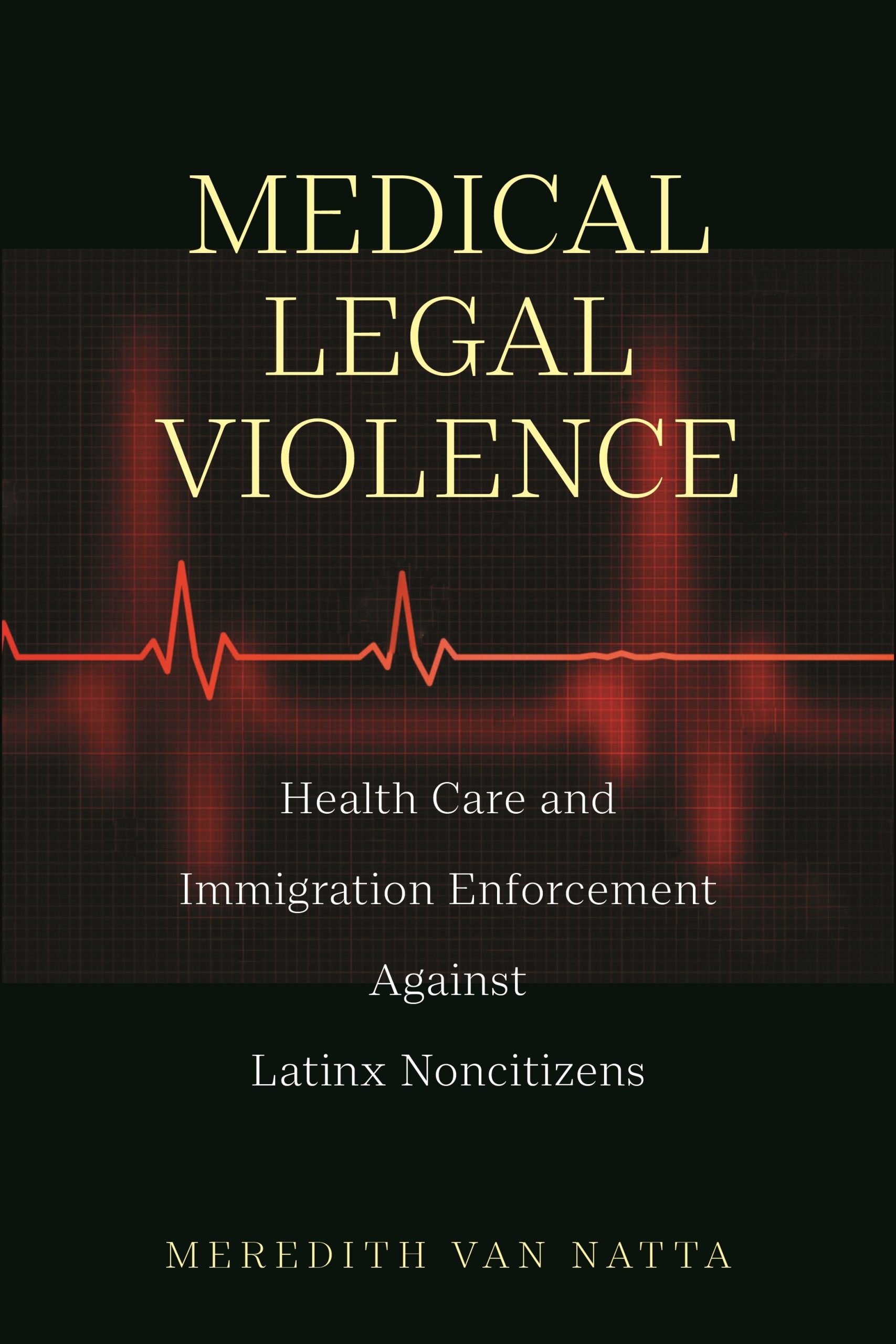Alejandra’s son was arrested during a traffic stop, during which the police said that his blood alcohol level was “a little high.” He got a lawyer, went to court, and was sentenced to community service. But when he went to sign his sentencing paperwork, immigration enforcement agents were waiting for him. Alejandra said that the court clerk had called the agents to turn over her son and several others who were in court at the time, and they took them all. “Right there, the same person who they go to to sign, they say it was him who called Immigration,” she explained. “They turned people in.”
I met Alejandra while conducting interviews with immigrants in the Southeast for my book Medical Legal Violence. A number of people I spoke with shared stories which, like Alejandra’s, emphasized how the inability to get or renew a driver’s license complicated their lives. As Doris Marie Provine and Monica W. Varsanyi argue, the driver’s license “is a state government’s most powerful tool in expressing its views about migrants”—a tool that shapes interactions well beyond the road by encompassing myriad civic and commercial spaces where anyone, from a retail worker to a bank teller, might demand photographic identification.
Raquel, who came to the United States from Mexico in 1995, brought up some of these issues when I met her in February 2020. She spoke at length about how challenging it was not to have access to a driver’s license. She explained that there used to be a lot of checkpoints, every eight days like clockwork, during which the police would target Hispanic drivers. I asked her what would happen if someone tried to go through a checkpoint without a license. “When you go through a checkpoint without a license, they give you a ticket and they don’t let you drive anymore, they take you out [of the car] there, or some people have even been arrested.” Raquel said that sometimes people got lucky, and that if the cop was a good person, they might let someone with a license come pick up the car on their behalf.
Raquel had been in the United States long enough to have a driver’s license, which she told me she was able to obtain and renew during the Clinton and Bush administrations, respectively. (Even though driver’s license eligibility is largely governed at the state level, she anchored the chronology in presidential administrations.) As we spoke, she took out her driver’s license from her wallet and showed me that it had expired in 2008, two years after the state began requiring registered drivers to have a social security number. I asked why she still kept the expired license with her, and she explained that she needed it in case she got pulled over by the police.
She had been pulled over only once at a checkpoint, and they saw the expired license and gave her a ticket. The fine was $200, Raquel explained, but she ended up paying $500 because she also had to hire a lawyer to avoid going to court herself to pay the ticket. “You better pay the court costs,” a friend had warned her. “Pay the lawyer so you don’t go to court, where you’ll risk them deporting you.” Raquel heeded this advice and maintained that, despite the costs, she was glad to have the expired license at all. “When I’ve presented my license, [the police] just say that I need to go renew it.” She continued, “But since I can’t renew it anymore here, it’s like . . . .” Raquel’s thought trailed off, unfinished—a rhetorical shrug at the catch-22 in which she found herself.
María, a middle-aged mother of four, described a similar logic behind keeping her expired license. Like Raquel, María described frequent traffic stops where the police would stop someone “for the tiniest reason” and ask for a license. “Sometimes it’s just a checkpoint or something, and they take advantage,” she explained. “‘There’s your ticket.’ And so I say—that’s why it’s good to have a license.” Echoing Raquel’s experience, María enumerated the compounding financial costs of such a stop. It was $250 for the expired license but more for having no license at all. Then there were the additional charges for a broken taillight or anything else they could find. “They take advantage of that,” Raquel continued. “The sneaky thing is that it ends up costing you almost $500, because if you get a lawyer, it comes out to $400 and change.”
More from our decarceral brainstorm
Every week, Inquest aims to bring you insights from people thinking through and working for a world without mass incarceration.
Sign up for our newsletter for the latest.
Newsletter
Carina, a thirty-four-year-old woman from Mexico who had lived in the United States since she was twelve, was tired of this vicious cycle of surveillance and penalty. Carina expressed frustration with several intersecting experiences of being an undocumented, uninsured young Latina struggling to manage chronic illness. She explained that her life would be easier if the state would grant driver’s licenses to undocumented residents. “It’s the way you live here,” she began. “It’s a really peaceful place, but at the same time there’s a lot of racism, at least in the town where I live. There are a lot of people that are from the countryside and give you bad looks.”
Carina emphasized how the simple fact of a driver’s license could ease her own burdens and keep her from further criminalization:
Unfortunately, they’ve given me a ticket four times, and I got a letter from License Services, the DMV, that if they catch me again, they’re going to put me in jail. I haven’t had a license since 2009. It’s been ten years already, that if I’ve had to take my kids to the doctor, I have to go so carefully, so that I don’t crash, so that nothing happens, that the kids are always in their car seats, with the seatbelts, everything to avoid arrest. You’re always between a rock and a hard place, what with all you have to do for the kids, taking them to school, to some appointment, or something, but you also go with that fear.
When I asked Carina about the circumstances of her tickets, she replied that they were always at a checkpoint. “Not because I’ve crashed or anything,” she explained. “All four have been at a checkpoint.” She described what it was like to have police stop her at checkpoints, which she said were all over the state, not just in the area where we met. “They make a checkpoint in an area where they know a lot of Hispanic people go by,” Carina elaborated, “or where there’s a lot of traffic.” She explained that at these checkpoints, which would be in place for one to two hours at a time, the police usually provided some flimsy pretext for pulling over drivers. “They say they’re looking for someone, but you know what they’re looking for is people without a license, that there’s a lot of us.” Reflecting on the exorbitant costs of the tickets and towing, and the threat of arrest, Carina said: “Yes, it’s serious. There’s no way you can keep doing this all the time. . . . Now we know precisely that they’re looking for us. . . . There are no safe zones.”
The longer I spoke with Carina, the more apparent the precariousness of her position became, balanced as she was on a tightrope with “no safe zones” around her. Like other undocumented people I spoke with in the area, she tried to stay out of trouble but could not altogether avoid interacting with government agencies. She had to drive, and sometimes that meant driving through checkpoints. She had to rely on presumptive Medicaid for the birth of her U.S.-born children, and she regularly provided endless documentation (including her own consular ID card) to keep them enrolled in full-scope Medicaid. Like many of the women I spoke with, Carina shouldered the family caregiving responsibilities that put her constantly in contact with agents of the state.
Carina’s situation highlighted how so many families exist in the tense, in-between space where conditionally engaging with the punitive and benevolent arms of government agencies becomes a matter of everyday life. Low-income U.S. citizens, especially those who are Black and brown, are subject to similarly insidious surveillance, but Carina was also undocumented. The stakes for her to negotiate this space were even higher, and she knew well that the consequences of a misstep could be more severe.
Carina had not always been undocumented. She had been living in the United States for twenty-two years—almost two-thirds of her life—and had arrived here with a visa that expired in 2010. I asked Carina whether, since she had come as a child and been living here so long, she had thought about applying for DACA.
Look, I did the process, but without support from a lawyer. I provided so much proof, so many documents. In fact, I had some boxes made with a notary, from people who are residents and who’ve known me since I arrived here, and they never approved [my application]. All they told me is that they needed proof that I had been here in school, that I had been enrolled in school. I sent them that proof and never heard anything after that. Since I was pregnant with [my daughter], I put my fingerprints in the IRS, and they’ve never told me anything. And for economic reasons I also never inquired. Now I’m, like, lost in the system. I’d need to talk with a lawyer to figure out everything about the process from my whole case.
“The government has your documents, but . . . ,” I began. “They’ve got me stuck there,” Carina said, concluding the sentence I had started. To get unstuck, she would need a lot of money. “It’s really expensive, it’ll cost me around $4,000,” she explained. “It’s so much money. For our economic situation, it’s so much money.”
Later in our conversation I asked whether Carina thought she might still qualify for DACA, which was in legal limbo between the Trump administration’s efforts to end the program and litigation over the legality of its suspension. Carina had asked a lawyer the same question—Was she still eligible?—and was told that she would have to begin the application process all over again. Given the political climate at the time, that seemed like a risky move:
It’s really hard. Right now, as a matter of fact, it’s been what? Five months since I spoke with, made an appointment with a lawyer, and they told me that right now it’s not recommended for anyone to move my case along because it could be irreversible. I want to do it right now, but it makes me scared. . . . Let’s hope there’s a change in the president or that some new law comes about or something that I can avail myself of to not leave the country.
Excerpted from Medical Legal Violence: Health Care and Immigration Enforcement Against Latinx Noncitizens by Meredith Van Natta, reprinted with permission from NYU Press.
Image: Tim Mossholder/Unsplash


